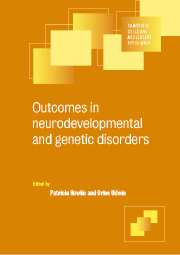Book contents
- Frontmatter
- Contents
- List of contributors
- Preface
- 1 Attention deficit hyperactivity disorder
- 2 Developmental language disorders
- 3 Reading and other specific learning difficulties
- 4 Metabolic disorders
- 5 Hemiplegic cerebral palsy
- 6 Autistic disorders
- 7 Down syndrome
- 8 Fragile X syndrome
- 9 Prader-Willi and Angelman syndromes: from childhood to adult life
- 10 Rett disorder
- 11 Tuberous sclerosis
- 12 Williams and Smith-Magenis syndromes
- Index
4 - Metabolic disorders
Published online by Cambridge University Press: 13 August 2009
- Frontmatter
- Contents
- List of contributors
- Preface
- 1 Attention deficit hyperactivity disorder
- 2 Developmental language disorders
- 3 Reading and other specific learning difficulties
- 4 Metabolic disorders
- 5 Hemiplegic cerebral palsy
- 6 Autistic disorders
- 7 Down syndrome
- 8 Fragile X syndrome
- 9 Prader-Willi and Angelman syndromes: from childhood to adult life
- 10 Rett disorder
- 11 Tuberous sclerosis
- 12 Williams and Smith-Magenis syndromes
- Index
Summary
Most inherited inborn errors of metabolism are perceived as paediatric diseases, presenting early in life and resulting in significant morbidity and mortality in infancy and childhood. Several of these conditions profoundly affect the nervous system, and in the past have resulted in considerable neurological debility in later life. However, advances in early diagnosis and therapy have significantly altered the natural course of many conditions, permitting prolonged survival. It is now well established that a number of disorders such as phenylketonuria and homocystinuria can be compatible with near-normal neurological and intellectual functioning. Nevertheless, as growing numbers of individuals advance into adolescence and adulthood, the full profile of the long-term outcome of such early-treated disorders is only now being unravelled. Older individuals with metabolic disorders frequently have abnormalities of intellectual function on formal testing, and unexpected neurological deterioration has occasionally been reported. Additionally, therapeutic interventions such as severely restricted diets and bone marrow transplantation are themselves commonly associated with psychological problems.
The spectrum of metabolic disorders is enormous. In this chapter we will discuss only the common conditions that are likely to be seen in a general neuropsychological setting.
Phenylketonuria
Phenylketonuria (PKU) is one of the commonest inborn errors of metabolism, occurring with a frequency of 1 : 12 000 in populations of European extraction. The enzyme deficiency results in very high blood phenylalanine levels (> 1200 μmol/l; normal levels > 120 μmol/l), which are toxic to the developing brain.
Keywords
- Type
- Chapter
- Information
- Outcomes in Neurodevelopmental and Genetic Disorders , pp. 74 - 111Publisher: Cambridge University PressPrint publication year: 2002

